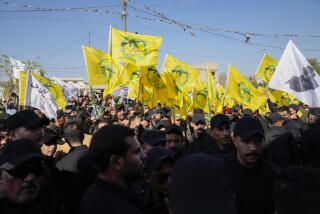U.S. Worries About Iranian Unit in Bosnia
- Share via
WASHINGTON — Despite reassurances from the Bosnian government, the Clinton administration is deeply concerned about the status of more than 200 Iranian Revolutionary Guards in Bosnia who are considered a major threat to the safety of American troops, senior U.S. officials said Monday.
The Iranians have played a significant role in training Bosnian Muslims and Muslims from other countries who fought in the 3 1/2-year civil war. Tehran has also provided more than 5,000 tons of arms, mainly small weapons, to the Bosnian Muslims, the officials said.
At a news conference Monday, Secretary of Defense William J. Perry said that he had assurances from Bosnian Prime Minister Haris Silajdzic that all 2,000 foreign Muslim fighters will be removed, according to provisions, within 30 days of the planned Dec. 14 signing of the Dayton peace pact.
But behind the scenes, administration officials fear that promise may be hard to keep.
Muslim fighters from countries such as Saudi Arabia, Egypt, Algeria, Afghanistan and Pakistan came as freelancers to fight with their brethren, according to Pentagon officials. The freelancers are not under the control or command of any country.
By contrast, the Iranians are the only unit sent by a government. And Bosnia may find it awkward to summarily boot out citizens of the Muslim country that most aided the beleaguered Bosnians militarily and financially when the outside world cut them off.
The closeness of the relationship was evident just last week when Iranian Foreign Minister Ali Akbar Velayati arrived in Sarajevo, the Bosnian capital, for talks with President Alija Izetbegovic. The trip to Bosnia and Croatia followed a speech last week by Iranian President Hashemi Rafsanjani in which he said that Iran and other Muslim countries should “spare no effort” to boost the defense capability of Bosnia--or rearm the country as the international embargo is lifted in phases.
Although Tehran views the Dayton plan as unjust to the Bosnian Muslims, Rafsanjani said that Iran will support it to end the killing of innocent people. He also pledged aid for reconstruction.
Rather than pull back from its involvement after the Dayton peace agreement, the Islamic republic appears to be even more interested in Bosnia, U.S. officials said Monday.
Tehran is now a leading force in mobilizing postwar support. Last week, Iran hosted a meeting of Islamic nations during which it appealed for new or increased aid from member states for Bosnia.
“Bosnia has been a major foreign policy issue for Iran. A few months ago, the Iranians had a whole week of Bosnian solidarity activities: marches and speeches that drummed down the fact the West was morally bankrupt and paid no attention to Muslim deaths,” a U.S. official said.
“It’s hard to believe this is a place or an issue Iran is willing to easily cede or withdraw from.”
The administration fears that Iran may use Bosnia as a venue for attacking American personnel or facilities in retaliation for tightened U.S. sanctions imposed last spring and for years of American hostility.
“Iran has its own agenda apart from Bosnia, and if the Iranians have an interest in targeting us, I would be concerned about what happens in Bosnia,” a senior administration official said.
Operatives of Iran’s Ministry of Intelligence already have been “active” around designated U.S. areas, he added. “They’re very attentive to what the Americans are doing, not just militarily. They keep an eye on us.”
Some U.S. officials have drawn parallels with Beirut, where pro-Iranian militiamen trained by a Revolutionary Guard contingent in eastern Lebanon bombed American peacekeepers in 1983, killing 241 U.S. Marines, and the U.S. Embassy in 1983 and 1984, killing 74 people, 20 of whom were Americans.
Finding incentives to get the freelancers out of Bosnia may be difficult, especially since there are few places that would welcome them. The Iranian unit, however, is expected to do what Tehran orders.
Ironically, Bosnia is the one area where the United States and Iran have often agreed. Both have called for an end to Serbian aggression and for a peace settlement that gives Bosnian Muslims majority control of the land.
Indeed, the administration was aware of Iran’s violation of the arms embargo but opted not to make an issue of it.
Times staff writer Stanley Meisler contributed to this report.
More to Read
Sign up for Essential California
The most important California stories and recommendations in your inbox every morning.
You may occasionally receive promotional content from the Los Angeles Times.













